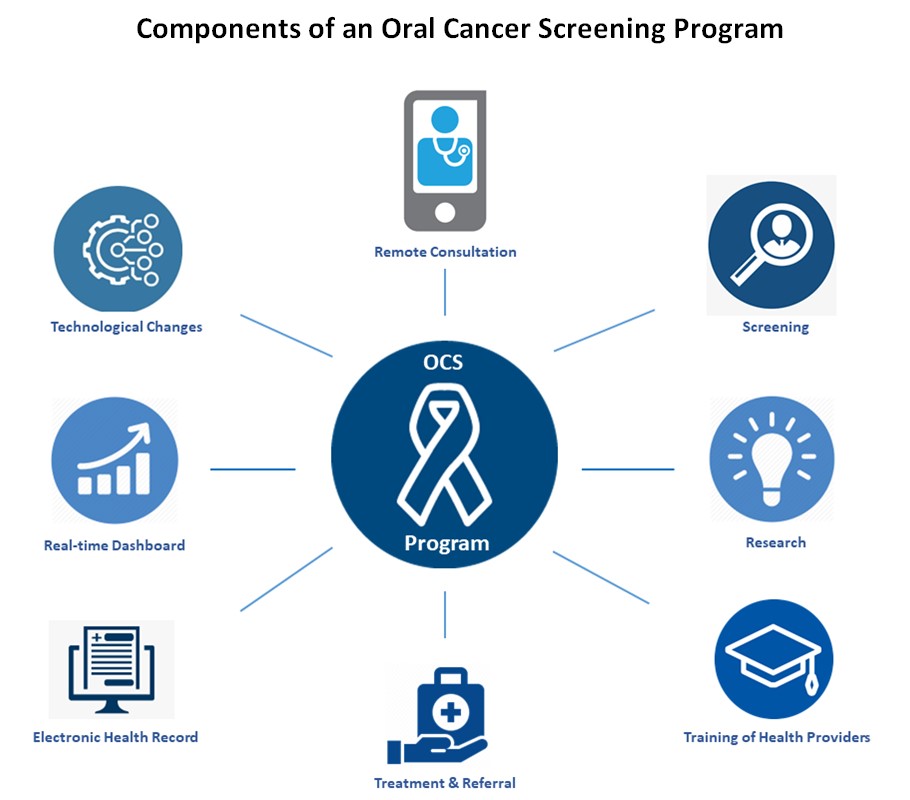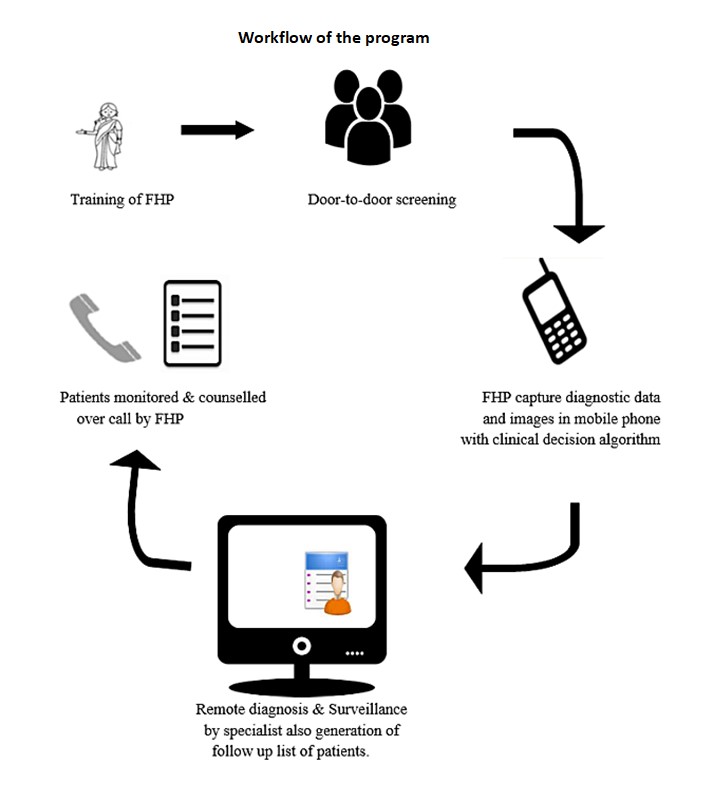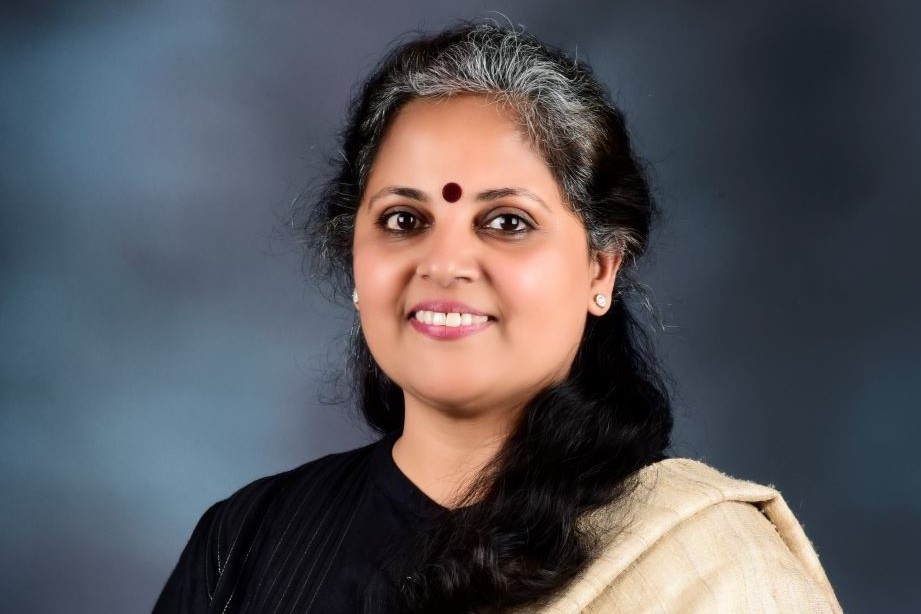Oral cancer is a widespread form of cancer in India, impacting both men and women and making up a third of all cancers in the country. The significant issue in addressing oral cancer is the lack of awareness and inadequate access to healthcare in marginalized populations, causing delayed diagnoses. To combat this, Biocon Foundation has created a technology-enabled program for oral cancer screening. The program aims to increase awareness, boost patient participation, and enhance communication between remote specialists and patients, while also empowering frontline healthcare providers. The foundation's healthcare mission is to reinforce primary healthcare by focusing on primordial and preventive measures, developing capacity, and utilizing technology-driven initiatives.
Dr Anupama Shetty, the Mission Director of Biocon Foundation, spoke to TheCSRUniverse about how the foundation's technology-enabled initiative and collaboration with tertiary health centres and academic institutions can have a lasting, meaningful impact on marginalized communities by providing timely interventions to discourage harmful habits. To learn more about her valuable insights, read the full interview below.
Q: What is your thought on the importance of screening and early detection of oral cancer, and what have been Biocon Foundation’s findings in terms of challenges and solutions on the same?
A: Oral cancer is the most prevalent cancer among Indian men due to the widespread use of tobacco, areca nut, betel quid, and alcohol. It accounts for around one-third of all cancers in India, with 135,929 new cases and 75,290 deaths, according to GLOBOCAN 2020.
Cancer of the lip and oral cavity is the most common cancer among men and the fourth most common cancer among women in India. The incidence rate of lip and oral cavity cancer stands at 10.3% a nd the mortality rate is 8.8%. A study by the International Agency for Research on Cancer GLOBOCAN 2020 Program estimated that India’s cancer burden is set to double in the next 20 years.
nd the mortality rate is 8.8%. A study by the International Agency for Research on Cancer GLOBOCAN 2020 Program estimated that India’s cancer burden is set to double in the next 20 years.
Challenges: Diagnosis of oral cancer is often delayed in marginalized, at-risk populations in rural areas owing to poor access to healthcare and lack of awareness. Early diagnosis leads to improved survival, decreased morbidity, and lower expenditures for patients.
However, the conventional method of screening has a few limitations. Inadequate patient compliance with follow-ups, lack of permanent portable records of data after screening, slow rates of information transfer, and poor communication between primary provider & specialist, are some of those.
Solutions: The integration of healthcare and technology is extremely effective in low- and middle-income countries. In an effort to address the burden of the disease and downstage oral cancer in our country, Biocon Foundation has pioneered oral cancer screening using a mHealth module. The mHealth system provides continuous two-way communication, enabling triage and tracking. This interface facilitates the connection between remote specialists and patients for diagnosis, follow-ups, and referrals. The multi-pronged approach features a robust surveillance system for monitoring high-risk groups in population-based and opportunistic screenings. The program aims to empower frontline healthcare providers (FHPs) by training them for early detection of the disease.
Integration of technology in low-resource settings was as much of a challenge as the utilization of it by unskilled staff. These were addressed by training, tests, and evaluation sessions conducted for healthcare workers. Pre and Post-tests are conducted on a regular basis for monitoring and evaluation to assess knowledge retention. The development of a “training the trainer” module has aided in capacity building for improvement in capturing images and identification of lesions.
As the early stages of oral cancer are asymptomatic, patients are not inclined to seek care. Therefore, the development of a Point-of-Care Technology has proven to be essential to improve compliance.
By effectively utilizing information, education, and communication tools at the screening sites we have been able to increase awareness regarding the de-addiction of habits. To tackle the issues of connectivity in rural areas, the mHealth device is designed to operate in an offline mode with seamless syncing of the data when an internet connection is provided.
issues of connectivity in rural areas, the mHealth device is designed to operate in an offline mode with seamless syncing of the data when an internet connection is provided.
Q: What is the foundation's healthcare mission? What are the other core areas or/and interventions that Biocon Foundation is working on, in the healthcare domain?
A: At the Biocon Foundation, we believe that a strong primary healthcare system creates a foundation that nurtures good health and wellness. Our multi-pronged efforts around strengthening the primary healthcare infrastructure include focus on primordial and preventive healthcare, innovations in workflow processes, capacity building, and technology-enabled initiatives. The Foundation collaborates with multiple partners including the State health authorities, non-governmental organizations, civil society organizations, and local authorities to ensure a multi-stakeholder approach. This would be integral to addressing and integrating the multisectoral determinants of health. Our healthcare initiatives include:
eLAJ smart clinic program: To support the primary healthcare system, the Biocon Foundation, in partnership with the Government of Karnataka, started the eLAJ Smart Clinic program in 2016. Today, it caters to over one million people across seven districts in the state. The program has been adopted at 20 government PHCs (Primary Health Centres) through a public-private partnership (PPP), and three clinics run by the Biocon Foundation. Through technology enablement, these smart clinics allow the monitoring of vital signs, multiple diagnostic tests, and the generation of electronic medical records (EMR), which allows better long-term care and diagnoses. In addition, we also focused on improving human resource availability and diagnostic capability. In FY22, eLAJ clinics witnessed over 70,000 footfalls and 22,000 lab tests. At the Biocon Foundation clinics, the eLAJ program works on a community outreach program with focus on specialist clinics for women & children health, non-communicable diseases, and geriatric health. Trained field health workers conduct regular household visits to raise awareness and conduct population-based surveillance for NCDs (Non-communicable diseases). The community outreach also includes inculcating government high-school students as change agents to address the burden of hypertension, with an objective of prevention and early detection of NCDs. The Child Health Activist Mentoring & Promoting Health in Society (CHAMPS) is a multi-stakeholder collaboration involving the Foundation, Narayana Health, NGOs, and education officials. The program aims to train students about hypertension and the procedure to check Blood Pressure readings and thereby instilling health-seeking behavior in students.
Mental Health Initiatives: To promote awareness, conversations, and self-care in Karnataka, the Biocon Foundation partnered with the Centre of Public Health, National Institute of Mental Health and Neuro Sciences (NIMHANS) for several initiatives.
- Bengaluru Urban Mental Health Initiative (BUMHI) initiative aims to develop, implement, and evaluate urban-specific strategies aimed at strengthening self-care and informal community care for mental health. This initiative is aligned with the WHO framework for mental health services.
- A Self-Care Mental Health Kit that aims to improve awareness about protecting and promoting mental health.
- Technology addiction amongst adolescents is considered an emerging behavioral addiction and they tend to have severe social deficiencies, impulsive behavior, oppositional symptoms, sensation-seeking tendency, and poor ability for self-regulation. To address this issue, the Foundation in collaboration with NIMHANS has started the School Health Initiative.
The Foundation is also working with St Johns Research Institute (SJRI) to initiate the peripartum mental health initiative. Though international guidelines recommend screening of mental health in women, primary care in India which provides obstetric services does not include the screening of common mental disorders (CMD) as a part of the antenatal check-up. For urban underprivileged women, access to quality care for mental health problems during pregnancy and in the postpartum period is a challenge. In resource-limited settings, “task-shifting” from the organized healthcare sector to community health workers (CHW) is one way of meeting this challenge. Based on this context, the SJRI team has trained CHWs to deliver supportive mental care. The trained CHWs screen pregnant women availing of antenatal services at a government facility and provide basic supportive mental health care. In addition, a psychiatrist also runs a psychiatry clinic twice a month. This ongoing research program will help determine adverse birth and peripartum outcomes among women with and without CMD. The results of the study will provide an opportunity for capacity-building, task-shifting, and scaling-up of innovations in antenatal healthcare practice in resource-limited settings.
Q: How has technology enabled health solutions helped your cause? What all different technological tools have you incorporated in this initiative?
A: Biocon Foundation implemented a mobile phone-based (mHealth) management platform that enables the creation of electronic health records and facilitates targeted screening for oral cancer. The program empowers frontline healthcare providers (FHPs) with mobile phones enabled with a decision-based algorithm for early detection of oral cancer. The platform connects remote specialists with rural populations for diagnosis and management. It also creates an opportunity for follow-ups and referrals. The screening process is evidence-based, as every patient is mapped with a unique patient identity correlated with risk factors such as habit history and clinically relevant intra-oral images. The functionality to capture high-resolution images and text notes along with a digital consent form, permits frontline health workers to convey to remote specialists, patient responses verbatim. Therefore, the program provides an end-to-end solution from early detection, management, and timely referral.
Advantages of our screening method:
• This screening is relatively simple and community health workers such as ASHAs and ANMs can be easily trained to identify lesions.
• It does not cause discomfort to the patient as the procedure is painless and requires less than five minutes per patient.
• The mHealth is portable and efficient as minimal infrastructure is required.
• It can be used in resource-constrained settings wherein specialists are unavailable.
• Results are available in forty-eight hours, thus eliminating the need for a second visit for collection of reports and reduction in the follow-up cases.
In addition, in collaboration with Indian Institute of Science (IISc), Bengaluru and IIIT-Hyderabad, an AI algorithm has been developed for the detection of pre-cancerous lesions by analyzing intra-oral photographs captured from mobile phones by health workers in the field.
The AI algorithm integrated within the mHealth app will empower the FHPs by enabling binary classification of the lesions into suspicious or nonsuspicious. This will eventually help to reduce the need for remote specialists for diagnosis.
Research is a significant aspect of the program. Under the aegis of the Oral Cancer Task Force (OCTF), research collaborations have led to the development of advanced Point-of-Care technologies for the early detection of the disease.
Q: Along with technological advancements in screening and treatment there is always a need for therapeutic innovations in terms of counselling, rehabilitation, and recovery support. What has Biocon Foundation been doing in that respect?
A: The lack of longitudinal patient records to synthesize patient information for long-term follow-ups in the absence of a digital database and specialists in rural areas for point-of-care diagnosis was a major challenge. The problem was addressed with the development of a mobile software to generate portable digital records and enable remote assistance and diagnosis from specialists for optimization of care.
Biocon Foundation has built meaningful partnerships with tertiary health centres and academic institutions for research and delivery of quality health services. Our partnerships with governmental and private organizations for counselling, rehabilitation, and recovery support ensure the closure of the referral loop and support for the patient. The approach seamlessly integrates patient triaging, tracking, referral, and follow-ups; thereby closing the referral loop.
Q: Who all are your partners and what are your expectations from them in terms of concrete social impact and its assessment?
We are working with multiple stakeholders. Our collaborations with academic institutions and tertiary health centres include:
- Bruhat Bengaluru Mahanagra Palike (BBMP), an administrative body responsible for civic amenities, and Bengaluru Political Action Committee, a nonpartisan citizen’s group to conduct oral cancer screening for Pourakarmika (sanitation workers)
- Collaborations with various institutes across the country for implementation of the program:
- Homi Bhabha Cancer Hospital, Varanasi under the aegis of Tata Memorial Center
- Rotary Quanta, Sakleshpur Taluk, Hassan
- Dr. B Borooah Cancer Institute, Assam
- Sri Guru Ram Das University of Health Sciences, Amritsar
- KLES Institute of Dental Sciences, Bengaluru to conduct oral cancer screenings in Karnataka
- Mazumdar Shaw Medical Foundation, Bengaluru collaboration for research initiatives.
- Christian Institute of Health Sciences and Research (CIHSR) who in turn have partnered with Government of Nagaland to carry out community based oral cancer awareness and screening programs in Nagaland.
- Tata Memorial Hospital (TMH), NCD cells of various state governments, National Institute of Cancer Prevention and Research (NICPR) and other regional cancer centers, to conduct training programs and workshops in Kerala, Karnataka, Uttar Pradesh, Punjab, Delhi, and Assam.
- Indian Institute of Science (IISc), Bengaluru to develop a deep learning algorithm for image analysis that will interface with a mobile application to bring about point-of-care diagnosis.
- International Institute of Information Technology, Hyderabad to improve the efficacy of the algorithm.
Q: The connection between oral cancer and dental hygiene is direct, and a dentist is often the first to identify and suspect any irregularities. Several NGOs, particularly run by medical professionals, are focused on managing dental hygiene and detecting oral cancer and other dental illnesses early on. However, many corporations concentrate only on mitigating oral health issues without considering dental health. How can corporations address this imbalance?
A: Corporate houses can develop a system to encourage awareness and education across communities that can enable participants to take informed actions.
In collaboration with KLES Institute of Dental Sciences, Bengaluru, we conduct over 12,000 dental camps annually, for the screening and treatment of general dental conditions. Patients are educated on the importance of maintaining oral hygiene and proper brushing techniques. Toothpastes are also distributed to encourage them to practice appropriate oral hygiene habits.
To address the problem of inadequacy of facilities and specialists in rural regions, a satellite clinic has been set-up in Kalkunte, Bengaluru, for basic dental treatment.
Q: How do you raise awareness especially in a country like India, where regular visits to the dentists are a rarity? Please briefly share the various awareness campaigns of the organisation.
A: In collaboration with Tata Memorial Centre, Biocon Foundation has created media content for promoting mass awareness for the public.
Awareness sessions are conducted at every screening camp on the harmful effects of tobacco and the importance of quitting the habit. The participants are educated on how to perform a self-mouth examination and encouraged for regular check-ups to monitor the progression of lesions.
In addition to opportunistic screenings, the program facilitates screening at the workplace at small factories and industries in the region of Anekal taluk, Bengaluru and Coffee Estate workers in Sakleshpur, Hassan. This is to ensure the screening of the high-risk population. Through the eLAJ program, frontline healthcare workers also visit house-to-house for screening and creating awareness. The Foundation also aims to increase engagement at the school level, by empowering students as child health advocates.





 nd the mortality rate is 8.8%. A study by the International Agency for Research on Cancer GLOBOCAN 2020 Program estimated that India’s cancer burden is set to double in the next 20 years.
nd the mortality rate is 8.8%. A study by the International Agency for Research on Cancer GLOBOCAN 2020 Program estimated that India’s cancer burden is set to double in the next 20 years. issues of connectivity in rural areas, the mHealth device is designed to operate in an offline mode with seamless syncing of the data when an internet connection is provided.
issues of connectivity in rural areas, the mHealth device is designed to operate in an offline mode with seamless syncing of the data when an internet connection is provided.












.jpg)



